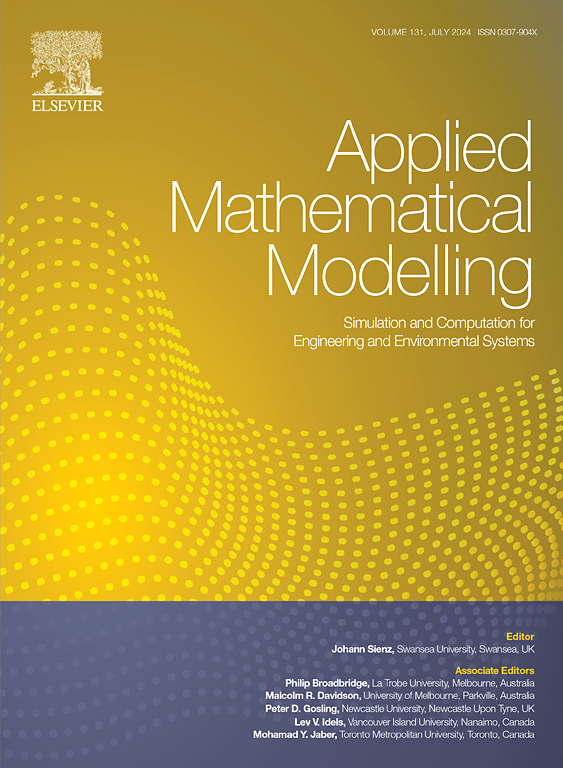Pharmaceutical logistics network planning considering low-carbon policy and demand uncertainty
IF 4.4
2区 工程技术
Q1 ENGINEERING, MULTIDISCIPLINARY
引用次数: 0
Abstract
Reducing carbon emissions has become a critical priority in the global effort to combat climate change. This study examined a pharmaceutical logistics network planning problem under drug demand uncertainty within the framework of a carbon cap-and-trade policy. An ambiguity set for medical demand is constructed using historical pharmaceutical order data to account for uncertainty. The problem is then formulated as a two-stage distributionally robust optimization model, with the first stage addressing facility location decisions and the second stage focusing on transportation strategies. A decomposition-based method was developed to solve this model by leveraging the structure of the proposed formulation. Numerical experiments demonstrated the practicality and effectiveness of the proposed models and solution approach. The results show that redesigning the logistics network and leveraging rail transit can achieve reductions of 14.71 % in total costs and 40.75 % in carbon emissions compared to the current case. The analysis also revealed that logistics network configurations and transportation strategies are highly sensitive to carbon pricing. Therefore, governments should enhance carbon emission oversight and stabilize carbon market prices to ensure the effective implementation of carbon cap-and-trade policies.
考虑低碳政策和需求不确定性的医药物流网络规划
减少碳排放已成为全球应对气候变化努力的关键优先事项。本文研究了碳排放限额与交易政策框架下药品需求不确定性下的药品物流网络规划问题。使用历史药品订单数据构建了医疗需求的模糊集来解释不确定性。然后将该问题表述为一个两阶段的分布式鲁棒优化模型,其中第一阶段解决设施选址决策,第二阶段关注运输策略。利用所提公式的结构,开发了一种基于分解的方法来求解该模型。数值实验验证了所提模型和求解方法的实用性和有效性。结果表明,与现有情况相比,重新设计物流网络和利用轨道交通可以使总成本降低14.71%,碳排放降低40.75%。分析还显示,物流网络配置和运输策略对碳定价高度敏感。因此,各国政府应加强碳排放监管,稳定碳市场价格,确保碳限额与交易政策的有效实施。
本文章由计算机程序翻译,如有差异,请以英文原文为准。
求助全文
约1分钟内获得全文
求助全文
来源期刊

Applied Mathematical Modelling
数学-工程:综合
CiteScore
9.80
自引率
8.00%
发文量
508
审稿时长
43 days
期刊介绍:
Applied Mathematical Modelling focuses on research related to the mathematical modelling of engineering and environmental processes, manufacturing, and industrial systems. A significant emerging area of research activity involves multiphysics processes, and contributions in this area are particularly encouraged.
This influential publication covers a wide spectrum of subjects including heat transfer, fluid mechanics, CFD, and transport phenomena; solid mechanics and mechanics of metals; electromagnets and MHD; reliability modelling and system optimization; finite volume, finite element, and boundary element procedures; modelling of inventory, industrial, manufacturing and logistics systems for viable decision making; civil engineering systems and structures; mineral and energy resources; relevant software engineering issues associated with CAD and CAE; and materials and metallurgical engineering.
Applied Mathematical Modelling is primarily interested in papers developing increased insights into real-world problems through novel mathematical modelling, novel applications or a combination of these. Papers employing existing numerical techniques must demonstrate sufficient novelty in the solution of practical problems. Papers on fuzzy logic in decision-making or purely financial mathematics are normally not considered. Research on fractional differential equations, bifurcation, and numerical methods needs to include practical examples. Population dynamics must solve realistic scenarios. Papers in the area of logistics and business modelling should demonstrate meaningful managerial insight. Submissions with no real-world application will not be considered.
 求助内容:
求助内容: 应助结果提醒方式:
应助结果提醒方式:


